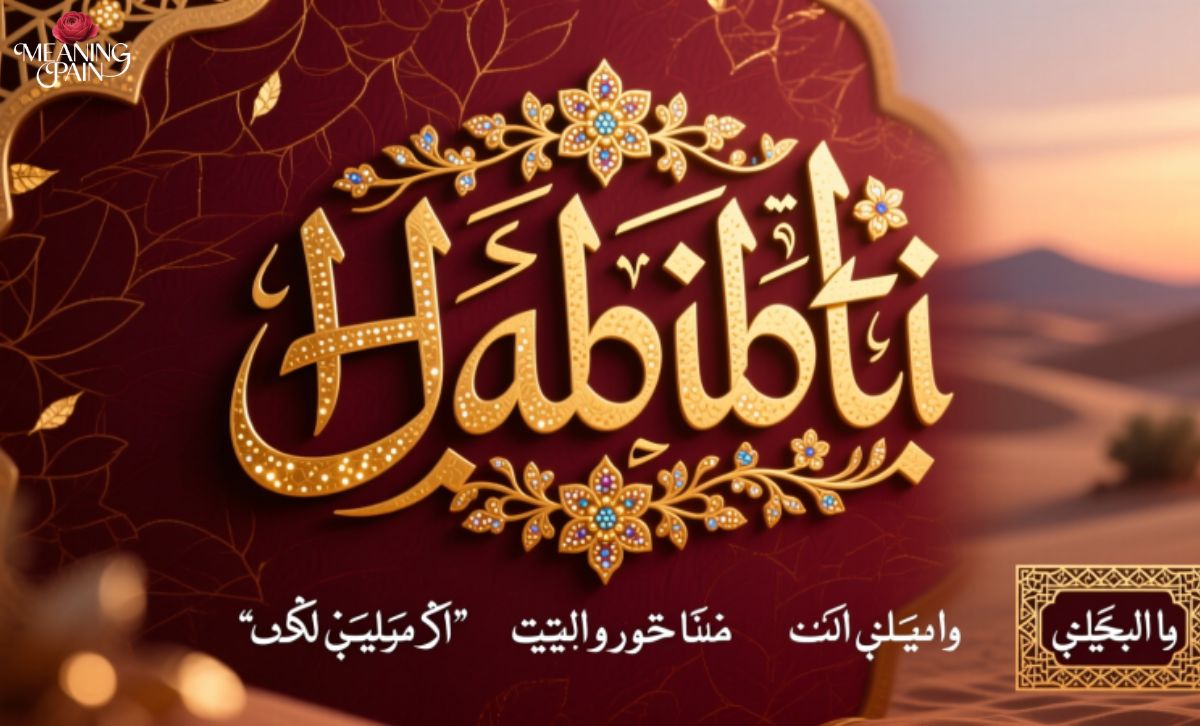The Word Habibti Meaning in Arabic (حبيبتي) is one of Arabic’s most cherished terms of endearment, translating to “my beloved” or “my darling” when addressing a female. This sweet expression combines “habib” (beloved) with the possessive suffix “-ti” (my), creating an intimate word that flows naturally in conversations between family members, close friends, and romantic partners. Whether a mother tenderly calls her daughter “habibti” or friends use it to express their bond, this word carries warmth that transcends simple translation.
The importance of “habibti” in human life lies in its power to strengthen emotional connections and express care in everyday moments. In Arabic-speaking cultures, using such affectionate terms isn’t reserved for special occasions—it’s woven into daily interactions, reminding people they are valued and loved. This simple word demonstrates how language shapes our relationships, turning ordinary exchanges into opportunities for emotional intimacy and reinforcing the social bonds that make us fundamentally human.
What Does Habibti Mean in Arabic?
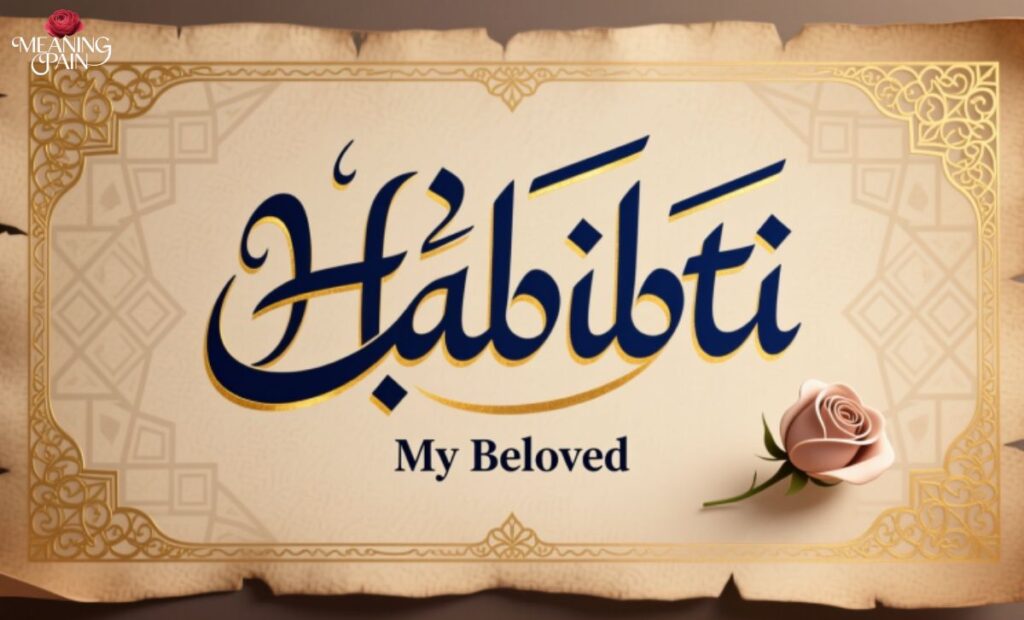
- Habibti — feminine form meaning “my beloved” or “my darling”
- Arabic — Semitic language spoken across Middle Eastern countries
- Endearment — affectionate term expressing love and closeness
- Beloved — someone deeply loved and cherished
- Darling — term of affection for someone special
- Feminine — grammatical gender used for female addressees
- Romantic — expressing love between partners or spouses
- Affection — warm feeling of fondness toward someone
- Intimate — close personal relationship between individuals
- Cultural — relating to Arab traditions and customs
Habibti vs Habibi: Understanding the Difference
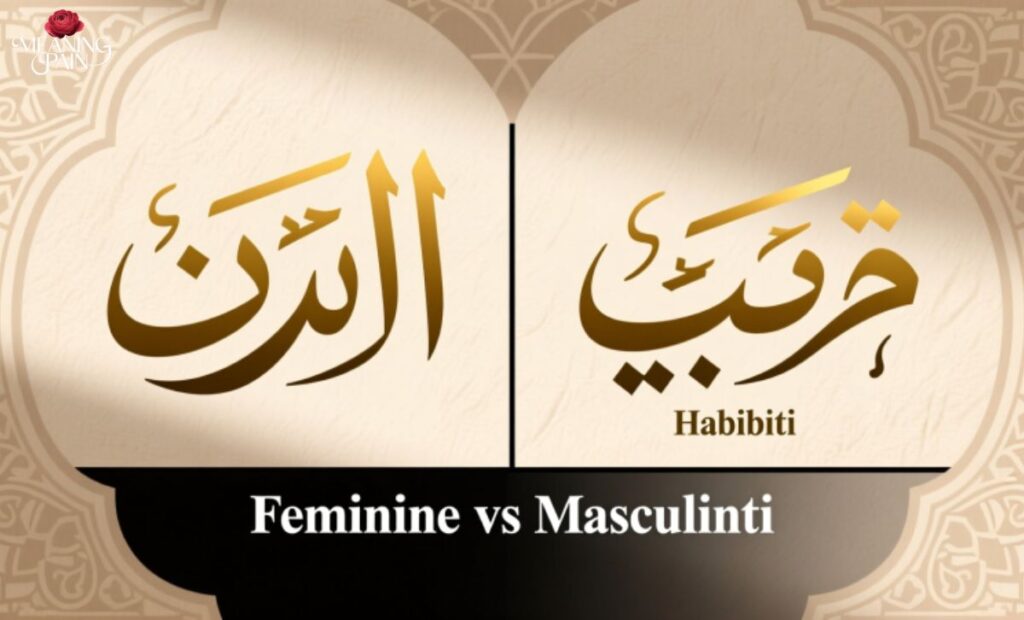
- Habibi — masculine form meaning “my beloved”
- Gender — distinction between male and female forms
- Masculine — form used when addressing males
- Suffix — ending that changes based on addressee
- Grammar — Arabic language rules for word formation
- Addressee — person being spoken to directly
- Context — situation determining which form to use
- Speaker — person using the term of endearment
- Pronunciation — slight difference in final vowel sound
- Usage — when and how each term applies
How to Write Habibti in Arabic Script
- Script — Arabic writing system using connected letters
- حبيبتي — the actual Arabic characters for habibti
- Calligraphy — beautiful artistic Arabic writing style
- Right-to-left — direction Arabic text is written
- Letters — individual characters forming the word
- Diacritics — marks showing vowel sounds above letters
- Connected — Arabic letters link together in words
- Handwriting — personal style of writing Arabic script
- Typography — printed Arabic fonts and styles
- Transliteration — writing Arabic sounds in English letters
Correct Pronunciation of Habibti (Audio Guide)
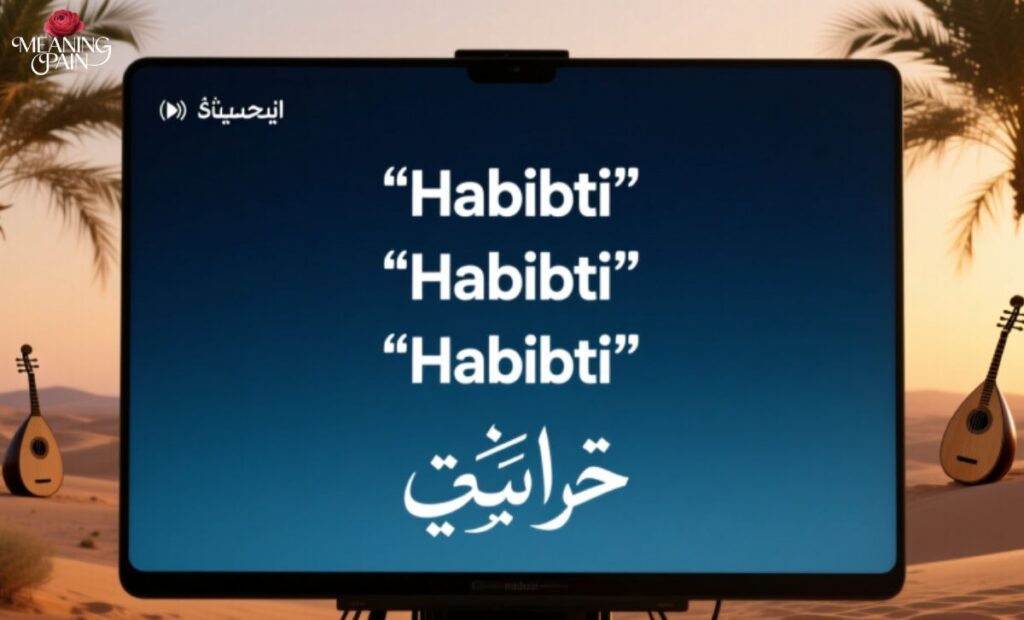
- Phonetics — study of speech sounds production
- Syllables — ha·bib·ti broken into three parts
- Stress — emphasis placed on middle syllable
- Vowels — a, i sounds within the word
- Consonants — h, b, t sounds forming structure
- Accent — regional variations in pronunciation
- Intonation — rising or falling pitch pattern
- Native — how Arabic speakers naturally pronounce it
- IPA — International Phonetic Alphabet representation [ħaˈbiːbtiː]
- Audio — recorded sound of correct pronunciation
- Rhythm — natural flow and timing of syllables
- Emphasis — giving special force to specific sounds
- Articulation — clear formation of each sound
- Listening — hearing native speakers say the word
- Practice — repeating pronunciation for improvement
- Mouth — positioning lips and tongue correctly
- Throat — producing the guttural ‘h’ sound
- Tongue — placement for different consonants
- Fluency — smooth natural sounding pronunciation
- Recording — audio samples for learning reference
The Linguistic Root and Origin of Habibti
- Root — basic three letter foundation of Arabic words
- ح-ب-ب — the trilateral root letters meaning love
- Etymology — study of word origins and history
- Derivation — how words form from root letters
- Semitic — language family including Arabic and Hebrew
- Classical — ancient Arabic language form
- Morphology — structure and formation of words
- Pattern — template applying vowels to root letters
- Hubb — the base word meaning love itself
- Historical — development through centuries of use
When to Use Habibti: Practical Guidelines
- Appropriate — suitable situations for using the term
- Relationship — connection between speaker and addressee
- Intimacy — level of closeness required for usage
- Family — acceptable when speaking to female relatives
- Romantic — primarily used between couples and partners
- Friends — close female friends in some cultures
- Children — parents addressing daughters affectionately
- Formal — not suitable for professional settings
- Informal — casual relaxed environments for usage
- Boundaries — understanding social limits and respect
Habibti in Everyday Arabic Conversations (Examples)
- Greetings — saying hello with affectionate tone
- Dialogue — natural conversational exchanges using habibti
- Phrases — common expressions incorporating the word
- Combination — habibti paired with other Arabic words
- Questions — asking habibti how she is doing
- Requests — politely asking for something with affection
- Compliments — praising someone using the endearment
- Goodbyes — farewell expressions including habibti
- Texting — written messages in modern communication
- Social — interactions in gatherings and meetings
Common Mistakes When Using Habibti
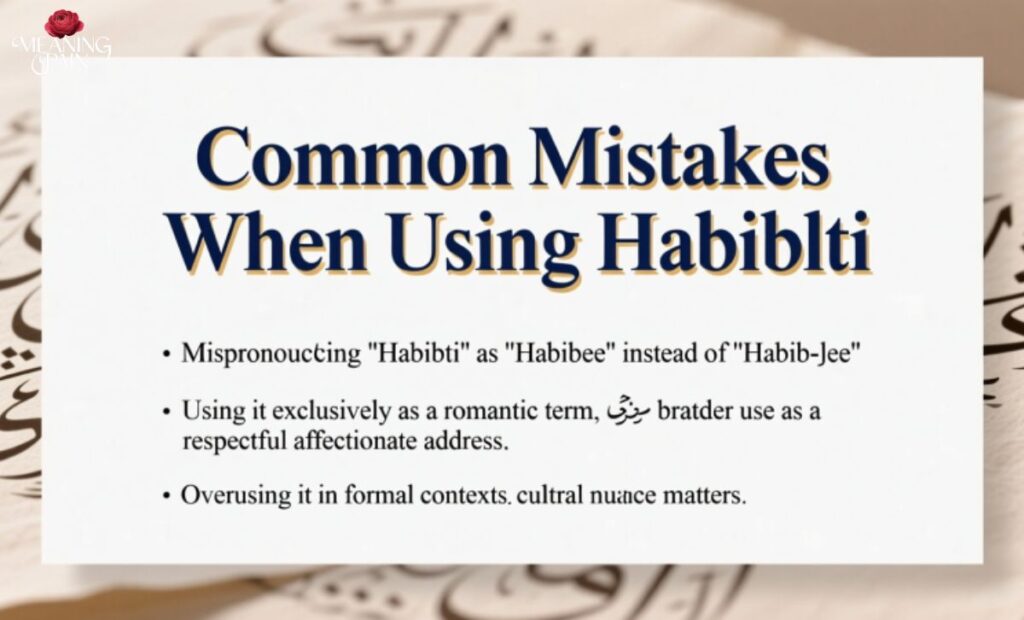
- Mispronunciation — saying the word incorrectly
- Gender — using wrong form for male addressee
- Overuse — saying habibti too frequently inappropriately
- Strangers — mistakenly using with unknown people
- Professional — using in workplace or business settings
- Disrespect — unintentionally offending through misuse
- Cultural — ignoring regional customs and norms
- Tone — delivering with wrong vocal expression
- Context — using in inappropriate situations
- Assumption — presuming closeness that doesn’t exist
- Age — addressing elders without proper respect
- Public — using in formal public gatherings
- Translation — literal word for word English interpretation
- Spelling — writing Arabic letters in wrong order
- Confusion — mixing up masculine and feminine forms
- Learners — common errors by non native speakers
- Offensive — accidentally causing discomfort to others
- Etiquette — violating social manners and customs
- Regional — not adapting to local dialect variations
- Sensitivity — lacking awareness of personal boundaries
Habibti in Arab Culture and Relationships
- Habibti means “my beloved” in Arabic, specifically used when addressing females.
- The term derives from the root word “hubb,” which means “love” in Arabic.
- Arab culture highly values expressing affection through verbal endearments in daily conversations.
- Habibti is commonly used between romantic partners, showing intimacy and emotional connection.
- Family members frequently use habibti when addressing daughters, sisters, or mothers affectionately.
- The word transcends romantic love and represents deep care in platonic relationships too.
- Friends in Arab society often call each other habibti to express warmth and closeness.
- Using habibti demonstrates cultural respect and understanding of Arabic social norms.
- The pronunciation is “ha-BIB-ti” with emphasis on the middle syllable for proper delivery.
- Context matters greatly when using habibti, as tone and relationship determine appropriateness.
Related Arabic Terms of Endearment Like Habibti
- Habibi is the masculine version of habibti, used when addressing males affectionately.
- Ya amar means “my moon,” a poetic expression comparing someone to celestial beauty.
- Rohi translates to “my soul,” indicating someone is essential to your existence.
- Albi means “my heart,” showing the person holds a special place emotionally.
- Omri signifies “my life,” expressing that someone gives meaning to your world.
- Ya helo/helwa means “beautiful one,” a compliment used for attractive or lovely people.
- Hayati translates to “my life,” similar to omri but with slightly different usage.
- Azizi/azizati means “my dear,” a more formal yet warm term of endearment.
- Ya ghali/ghaliya means “precious one,” indicating someone’s high value to you.
- Nour el ein translates to “light of my eye,” a beautiful metaphor for someone cherished.
Why Learning Habibti Matters for Arabic
- Understanding habibti provides insight into Arabic emotional expression and communication styles.
- Learning these terms helps language learners sound more natural and culturally aware.
- Arabic speakers appreciate when foreigners use appropriate endearments like habibti correctly.
- The word appears frequently in Arabic music, poetry, and literature across generations.
- Knowing habibti enhances your ability to understand Arabic media and entertainment content.
- Cultural competence increases when you grasp the emotional weight behind habibti’s usage.
- Business relationships in Arab countries often involve personal warmth, making habibti relevant.
- Social integration becomes easier when you can express affection appropriately in Arabic.
- Language depth improves as habibti connects to broader concepts of love terminology.
- Understanding context for habibti teaches important lessons about social boundaries.
- Arabic dialects may have variations of habibti, expanding your regional vocabulary.
- Film and television from Arab countries frequently feature habibti in dialogue.
- Travel experiences in Arabic-speaking regions become richer with endearment knowledge.
- Relationship building with Arabic speakers strengthens through proper use of habibti.
- Professional translation and interpretation require understanding these nuanced terms accurately.
- Cross-cultural marriages benefit when partners understand endearments like habibti deeply.
- Social media and online communication in Arabic commonly feature habibti expressions.
- Teaching Arabic to others becomes more effective with cultural context around habibti.
- Emotional intelligence in multilingual settings grows through learning these intimate words.
- Authentic connections with Arab communities develop when you respect and use habibti appropriately.
Frequently Asked Questions
What does habibti mean in Arabic?
Habibti means “my beloved” or “my darling” in Arabic and is used specifically for females. It comes from the root word “hubb” (love).
Example: A husband says to his wife, “Habibti, how was your day?” expressing affection and care.
Can I use habibti with friends or only romantic partners?
You can use habibti with both friends and romantic partners. In Arab culture, it’s common between close female friends, family members, and loved ones.
Example: A woman tells her best friend, “Habibti, I missed you so much!” showing platonic love and warmth.
What’s the difference between habibi and habibti?
Habibi is the masculine form (for males), while habibti is the feminine form (for females). Both mean “my beloved.”
Example: You say “Habibi” to your brother and “Habibti” to your sister when expressing affection.
Is it appropriate for non-Arabs to use habibti?
Yes, non-Arabs can use habibti if they understand the context and have an appropriate relationship with the person. Arabic speakers usually appreciate the effort.
Example: A foreign student says to her Arab friend, “Habibti, thank you for helping me!” showing cultural respect.
When should I avoid using habibti?
Avoid using habibti in formal settings, with strangers, or with people you don’t have a close relationship with, as it may seem inappropriate or overly familiar.
Example: Don’t say “Habibti” to your boss or a business client; use formal terms like “Ustaza” (teacher/ma’am) instead.
Conclusion
Habibti is a beautiful Arabic word meaning “my beloved,” used to show love toward females. You can say it to your girlfriend, sister, or close friend to create an instant warm connection. Learning habibti helps you understand Arab culture and shows genuine respect when talking with Arabic speakers.
Using habibti makes your Arabic sound more natural and strengthens your relationships. Remember to use it only with people you’re close to, not in formal settings. By learning this endearment, you’re embracing the emotional richness of Arab culture and bringing more warmth to your conversations.

James Dean was an American actor and cultural icon of teenage rebellion, best known for Rebel Without a Cause, Giant, and East of Eden.
